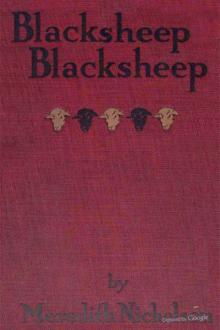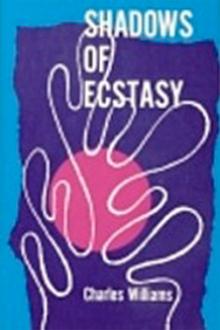Blacksheep! Blacksheep!, Meredith Nicholson [reading women .txt] 📗

- Author: Meredith Nicholson
- Performer: -
Book online «Blacksheep! Blacksheep!, Meredith Nicholson [reading women .txt] 📗». Author Meredith Nicholson
"The end justified the means, I think," said Mrs. Congdon.
"I found a friend I'm not going to lose as one result," said Putney. "And if the sick man across the bay recovers I hope I have another lifelong friend there."
"Oh, it's all so strange!" cried Mrs. Congdon. "One might think that we must suffer tribulation before we know what perfect happiness is! And I never expect to understand all that has happened to you men. Is it possible that you'll ever settle down again?"
"That depends—" Archie remarked, glancing meaningfully at Isabel,—a glance which Mrs. Congdon detected and appraised with that prescience which makes every woman a match-maker.
On the wharf they lingered, like a company of old friends reluctant for even a brief parting; Ruth, lantern in hand, stood beside Mrs. Graybill, looking like a child beside the stately woman. As Archie cried "All aboard," Julia caught Ruth in her arms and kissed her.
"Good night, little girl!" she said softly.
It was like a benediction and the very graciousness of act and word lightened Archie's vigil as all night he watched outside the Governor's door.
VOn the eighth day Dr. Mosgrove announced that his visits were no longer necessary; he ran up to Huddleston, he told Archie, for the pleasure of meeting the agreeable people he found there. The Governor was making an extraordinary recovery, and the bracing northern air would soon set him up. Someone was always on the water between Leary's hotel and Heart o' Dreams, and clouds no longer darkened the bay.
Dr. Mosgrove had made a careful examination of Carey, and recommended that he be sent to a sanatorium for treatment. Perky undertook to carry him to a private institution near Chicago suggested by the doctor, and this became another of the series of strange errands that fell to the lot of the Arthur B. Grover. Eliphalet Congdon had been importuning Archie to release him, but it had seemed wise to give the erratic millionaire more time in which to meditate upon his sins.
When the tug returned Archie found that the old gentleman had taken advantage of a day's parole in Chicago to do considerable shopping. In a new suit of clothes he really looked, as Perky said, like a white man; but the change in him was not merely as to his outward person. He opened a bag on deck and displayed with pride a pearl necklace he had purchased for his daughter-in-law, a handsome watch for young Edith and another for his grandson, whom Mrs. Congdon had left with a friend in the east.
"I guess I haven't been square with Putney," he remarked, "and now's a good time to let him know how I feel about it. Here," he continued, producing a bulky envelope, "is two hundred and fifty thousand dollars in government bonds that he may use as he likes."
"Grand; perfectly bully!" cried Archie. "Please consider yourself discharged from the ship. We'll go right over to Heart o' Dreams and spread the glad tidings."
Though so many vistas were brightening, Archie was still troubled by Isabel's persistent refusal to see him alone, or to give him any opportunity to break down the barriers she had raised against him. After luncheon at the camp, where Eliphalet Congdon proved himself a very likable human being, he sought her as she was leaving the dining hall.
Her young charges were skipping gaily about her; there was no question of their admiration and affection for her. He caught the spirit of their gaiety and took advantage of a moment when Isabel emerged smiling from an adoring group to plant himself before her.
"You are running away from me!" he said sternly. "And that's not fair."
"Oh, this is my busiest day! You mustn't think a place like this runs automatically."
"I think nothing of the kind. But your studied efforts to escape from me are embarrassing. Ruth, the Congdons, Mrs. Graybill—everybody is noticing it!"
"Certain matters are one's personal affair," she answered. "Really I must ask you to excuse me."
"I refuse to be snubbed again! You are trampling me under foot, and I refuse to be stepped on any more. I wish to assure you, Miss Perry, that my love for you is not to be spurned with impunity!"
"Please be careful! Those girls over there are watching us."
"A wonderful opportunity for them to see a desperate man making love; an invaluable part of their education! They will never forget how I fell upon my knees and declared myself!"
"Oh, you wouldn't! You really wouldn't! You forget that these children are highly impressionable!"
"So am I, and extremely sensitive. It would be fine if you'd join me in a little walk. If you refuse I shall follow you the rest of the day singing. The Governor and I did a good deal of singing in our travels and—"
As he filled his lungs as though about to burst into song she hastily turned toward the wood.
"You seem to forget that I'm mistress here while you're merely a guest! I hate to say it, but you're in serious danger of becoming a nuisance."
"You're not resentful and hateful enough yet to frighten me away.
'He either fears his fate too much, Or his deserts are small, That dares not put it to the touch To gain or lose it all.'"It's a fact we can't escape from that you and I are not free agents and we haven't been from the very moment we met at May's house. And the lines converge here; you've got to admit that!"
"But they lead away again in quite opposite directions. It is cruel of you to insist—"
"I insist that I love you! That's the only thing that matters!"
"Except," she corrected, "your cheerful assumption that I reciprocate the feeling, when—"
"Let me begin all over again," he interrupted hastily. "You must realize that all the odd happenings that followed our meeting in Washington have come out pretty well; only this little affair of ours—"
"You call it an affair! Calamity would be a better term for it."
This silenced him for some time. Tradition held that the trail they followed was an inheritance from Indian times; it was like an ineffaceable line drawn in the forest by the red men in assertion of their permanent title to the soil.
As she walked before him, carrying her head high, his heart ached with love for her. It would be best perhaps not to urge her further; to wait until the camp closed and then see her in a different environment. It might be that his sister would arrange this for him, and he took courage from the thought.
"It has been in my mind for a day or two that May must be wondering what's become of me. I always write to her, you know; and she imagines me in the Rockies. There must be a stack of mail waiting for me at Banff; I must wire to have it forwarded."
"You needn't necessarily give up the trip—"
She turned her head to dodge an overhanging bough and he caught a glimpse of her face; she was crying; and new and world-shaking emotions were stirred in him by the sight of her tear-wet cheek.
"Do you know," he said, "when we talk about clearing up things I'd forgotten about that buried treasure. I think it would be a mistake for me to leave without exhausting all the possibilities of finding your grandfather's buried gold. I wonder if poor Carey knew any more about it than you do!"
"I'm sure he didn't. There are holes here and there in these woods that he dug in his search. He had an idea that it might be found in the ruins of grandfather's house, but that stood where I built the camp hall and I had the old cellar thoroughly explored. Why!" she exclaimed, stopping short and glancing about thoughtfully, "that's strange."
"We're lost, I hope!"
"Not lost; but there was a fork in the trail and I must have made the wrong turn. I don't remember that I ever saw that fallen tree before."
At some time, perhaps several years earlier, a storm had evidently centered its fury about the place where they stood, and a big hemlock crushing in its fall several smaller trees lay prone across the trail.
"That old fellow must have made a mighty crash when he went down. I'm sure that I never came this way before."
"Here's an old scar," said Archie, "where some one must have blazed the tree years and years ago. It's the mark of an ax or hatchet. And look! Three other big trees bear the same mark. They define a square and must have been made for some purpose!"
Discussion of the markings brought them immediately into accord. Isabel was perplexed to find herself in a spot she had never visited before though she had spent the previous summer on the land, planning the camp, and thought she knew every foot of it. She peered into the pit torn by the roots of the huge tree. The sunlight glinted brightly upon something that lay half hidden in the earth.
"Oh, how wonderful!" she cried and placed a gold piece in his hands.
They knelt together, tearing up the weeds and loosening the earth. It was Archie who quickly found a second coin, a ten-dollar gold piece stamped 1859. With a stick he dug into the hole and soon they had made a little heap of bright coins, laughing like children with each discovery. A deeper probe resulted in the unearthing of a splintered cedar plank evidently torn from a chest that had contained the money.
"Of all the astonishing things that ever happened this is the most utterly paralyzing!" exclaimed Archie jubilantly.
Using the board as a spade he scooped out a capful of coins—gold, American, English and French, which the Southerner had buried in the northern wilderness.
"It won't do to leave this place unprotected, and we must stop or we'll have more than we can carry. We must bring Putney back to help. It's my guess that there's a chest of money at the foot of each of these blazed trees."
"And pretty good hiding places, too, where the gold might have remained forever if—"
"If you hadn't been hating me so that you lost your way!"
They stood with the heap of gold between them, the bewilderment of discovery in their eyes.
"This is the end of the rainbow and the gold lies at our feet!" he said, and he took her hands, and the one still wearing the bandage he held very, very gently. "Love we know to be better than much fine gold; and wouldn't it be a pity for the finding of these coins to mark the very end, with nothing beyond! And life is so big and wonderful I want your help to make mine of some use—"
She looked at him long and searchingly, and her eyes were so grave, their questioning seemed so interminable, that he did not know until she spoke that her lips had trembled into a smile.
"If you can forgive me," she said; and she laid her hands upon his shoulders, lightly as though by their touch she were investing him with her hope in life renewed and strengthened, and giving pledge that they would walk together thereafter to the end of their days.
During his convalescence the matter of the sixty thousand dollars taken from Seebrook at Cornford troubled the Governor greatly. While he had not personally profited by that transaction it was, he said, his nearest approach to actual larceny and he wished to make reparation, the more particularly as Eliphalet complained that the





Comments (0)